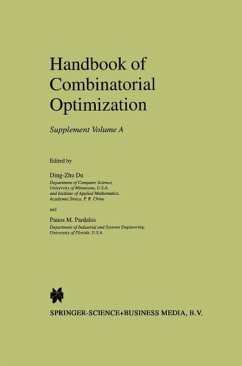
Facets of Combinatorial Optimization (eBook, PDF)
Festschrift for Martin Grötschel
Redaktion: Jünger, Michael; Reinelt, Gerhard

PAYBACK Punkte
36 °P sammeln!
Martin Grötschel is one of the most influential mathematicians of our time. He has received numerous honors and holds a number of key positions in the international mathematical community. He celebrated his 65th birthday on September 10, 2013. Martin Grötschel's doctoral descendant tree 1983-2012, i.e., the first 30 years, features 39 children, 74 grandchildren, 24 great-grandchildren and 2 great-great-grandchildren, a total of 139 doctoral descendants.This book starts with a personal tribute to Martin Grötschel by the editors (Part I), a contribution by his very special "predecessor" Manfr...
Martin Grötschel is one of the most influential mathematicians of our time. He has received numerous honors and holds a number of key positions in the international mathematical community. He celebrated his 65th birthday on September 10, 2013. Martin Grötschel's doctoral descendant tree 1983-2012, i.e., the first 30 years, features 39 children, 74 grandchildren, 24 great-grandchildren and 2 great-great-grandchildren, a total of 139 doctoral descendants.
This book starts with a personal tribute to Martin Grötschel by the editors (Part I), a contribution by his very special "predecessor" Manfred Padberg on "Facets and Rank of Integer Polyhedra" (Part II), and the doctoral descendant tree 1983-2012 (Part III). The core of this book (Part IV) contains 16 contributions, each of which is coauthored by at least one doctoral descendant.
The sequence of the articles starts with contributions to the theory of mathematical optimization, including polyhedral combinatorics, extended formulations, mixed-integer convex optimization, super classes of perfect graphs, efficient algorithms for subtree-telecenters, junctions in acyclic graphs and preemptive restricted strip covering, as well as efficient approximation of non-preemptive restricted strip covering.
Combinations of new theoretical insights with algorithms and experiments deal with network design problems, combinatorial optimization problems with submodular objective functions and more general mixed-integer nonlinear optimization problems. Applications include VLSI layout design, systems biology, wireless network design, mean-risk optimization and gas network optimization.
Computational studies include a semidefinite branch and cut approach for the max k-cut problem, mixed-integer nonlinear optimal control, and mixed-integer linear optimization for scheduling and routing of fly-in safari planes.
The two closing articles are devoted to computational advances in generalmixed integer linear optimization, the first by scientists working in industry, the second by scientists working in academia.
These articles reflect the "scientific facets" of Martin Grötschel who has set standards in theory, computation and applications.
This book starts with a personal tribute to Martin Grötschel by the editors (Part I), a contribution by his very special "predecessor" Manfred Padberg on "Facets and Rank of Integer Polyhedra" (Part II), and the doctoral descendant tree 1983-2012 (Part III). The core of this book (Part IV) contains 16 contributions, each of which is coauthored by at least one doctoral descendant.
The sequence of the articles starts with contributions to the theory of mathematical optimization, including polyhedral combinatorics, extended formulations, mixed-integer convex optimization, super classes of perfect graphs, efficient algorithms for subtree-telecenters, junctions in acyclic graphs and preemptive restricted strip covering, as well as efficient approximation of non-preemptive restricted strip covering.
Combinations of new theoretical insights with algorithms and experiments deal with network design problems, combinatorial optimization problems with submodular objective functions and more general mixed-integer nonlinear optimization problems. Applications include VLSI layout design, systems biology, wireless network design, mean-risk optimization and gas network optimization.
Computational studies include a semidefinite branch and cut approach for the max k-cut problem, mixed-integer nonlinear optimal control, and mixed-integer linear optimization for scheduling and routing of fly-in safari planes.
The two closing articles are devoted to computational advances in generalmixed integer linear optimization, the first by scientists working in industry, the second by scientists working in academia.
These articles reflect the "scientific facets" of Martin Grötschel who has set standards in theory, computation and applications.
Dieser Download kann aus rechtlichen Gründen nur mit Rechnungsadresse in A, B, BG, CY, CZ, D, DK, EW, E, FIN, F, GR, HR, H, IRL, I, LT, L, LR, M, NL, PL, P, R, S, SLO, SK ausgeliefert werden.













